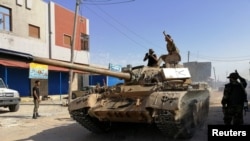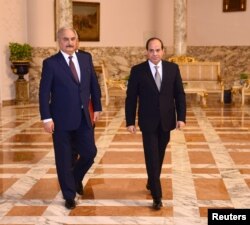Qatar called on Tuesday for a blocking of foreign arms supplies to eastern Libyan forces commander Khalifa Haftar, whose push to seize the capital Tripoli is causing rifts around the Gulf and Europe.
Nearly two weeks into its assault, the veteran general's eastern-based Libyan National Army (LNA) is stuck in the city's southern outskirts battling armed groups loyal to the internationally-recognized Tripoli government.
Yet Tripoli's roughly 2.5 million people were maintaining a semblance of normality - even as the occasional artillery boom echoed across the city.
"We are still carrying on, thank God. What else can we do?" said Mohamed Taha, 23, in a street where students still packed a nearby school. Cafes and shops also remained open and busy.
Foreign powers are worried but unable to present a united front over the latest flare-up in the cycle of anarchy and warfare that has gripped Libya since dictator Muammar Gadhafi was toppled in 2011.
The conflict has brought a growing humanitarian toll - 174 people, 756 injured and 18,250 displaced according to latest United Nations tallies - and sunk for now an international peace plan.
It threatens to disrupt oil flows, foment migration across the Mediterranean Sea to Europe, and allow jihadists to exploit the chaos.
Qatar said an existing U.N. arms embargo on Libya should be strictly enforced, to prevent Haftar, 75, from receiving arms.
The Benghazi-based Haftar enjoys the backing of Egypt, the United Arab Emirates and Saudi Arabia, who view him as an anchor to restore stability and combat Islamist militants. Those three nations cut ties with Qatar in 2017, accusing it of support for militants and Iran.
Qatar's Foreign Minister Sheikh Mohammed bin Abdulrahman al-Thani told Italian daily La Repubblica that a postponed U.N. peace conference should be rescheduled and Haftar's troops forced to withdraw.
The arms embargo must be implemented "to prevent those countries that have been providing ammunitions and state-of-the-art weapons from continuing to do so," he said.
Past U.N. reports say the UAE and Egypt have both supplied Haftar with arms and aircraft, giving him air superiority among Libya's multiple factions. East Libyan authorities say Qatar and Turkey back rival, Islamist-leaning factions in western Libya.
UN may demand ceasefire
The Gulf diplomatic divisions echo those in Europe, where former colonial ruler Italy and France have sparred over Libya.
Paris has given Haftar support in the past, viewing him as the best bet to end the chaos since a NATO-backed rebellion to end Gadhafi's murderous four-decade rule.
Italy, with considerable oil interests in the OPEC member, supports the Tripoli government of Prime Minister Fayez al-Serraj and was furious with French reluctance to back a recent European Union resolution urging Haftar to halt his advance.
Nevertheless, Serraj has managed to keep the LNA at bay, thanks largely to armed groups who have rushed to aid them from other western Libyan factions.
The U.N. Security Council is considering a British-drafted resolution that would demand a ceasefire and urge all nations with influence over the warring parties to ensure compliance.
The 15-member council has expressed concern but been unable so far to issue a more formal statement, diplomats said, as Russia objected to a reference to the LNA while Washington said it could not agree a text that did not mention Haftar's forces.
Though Haftar presents himself as a champion against what he calls terrorism, opponents cast him as a would-be dictator in the mold of Gadhafi. About 70 people protested against him at the central Algiers Square in Tripoli on Tuesday.
"We are against Haftar and military rule," said demonstrator Assam Dirbiq.
Haftar was among officers who helped Gadhafi rise to power in 1969, but fell out with him during a war with Chad in the 1980s. He was taken prisoner by the Chadians, rescued by the CIA, and lived for about 20 years in Virginia before returning in 2011 to join other rebels in the uprising against Gadhafi.








